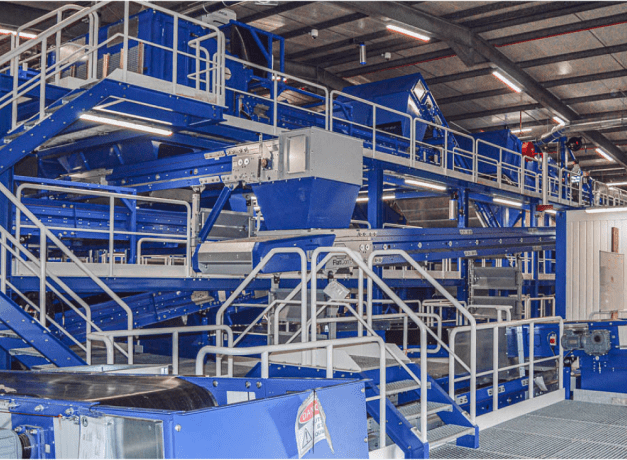The waste management and disposal industry has always had an important role to play in protecting our environment from pollution and contamination. From collecting rubbish to incinerate or dispose of in landfill, to safely containing hazardous waste, through to composting and recycling, businesses within the industry provide a wide selection of services to keep our environment clean.

One of the most significant milestones has been the shift from traditional waste disposal to a holistic approach that includes reduction, recycling, recovery, and responsible disposal. In recent decades, attitudes toward sustainability and a circular economy have evolved, with people and businesses alike making conscious efforts to change the way they dispose of waste. This has been supported by multiple acts of legislation (e.g., UK Waste Regulation 2015) implemented by the government to improve waste management. More recently, the government introduced a waste management plan which sets out its vision to minimise waste and re-use materials.
With a myriad of complexities surrounding the handling of waste and pressure mounting on the industry to drive positive change, industry leaders come together each year at The Resource & Management Expo (RWM) to discuss critical issues and learn about innovative solutions.
Five trends that have caught our attention
In recognition of the RWM, we take a look at the top trends happening in waste management and how hydraulics can support this.
- Recycling and resource recovery
Recycling programmes have become more widespread and sophisticated, allowing for the recovery and reuse of materials like paper, plastics, glass, and metals. Thanks to advances in recycling technology, the processing of recyclables is becoming more efficient and cost effective.
Hydraulics are involved in various aspects of waste recycling, helping to automate and optimise movement as well as the sorting and processing of materials. Conveyor systems transport materials, whilst hydraulic pumps and cylinders are used to control the movement of belts, hoppers, and chutes enabling precise material placement and sorting. Other popular uses of hydraulics include bailors to compress and compact materials; sheers and shredders to break down large items; and compactor ejectors to push compact waste out of a container.
- Hazardous waste management
Stricter regulations and improved handling methods have been implemented for hazardous waste (e.g., chemicals, brake fluids, pesticides etc.), which ensures safer disposal and minimises environmental risks. In the UK, for example, as part of a duty of care, you might need a licence or permit if you are a producer, carrier, or consignee.
To facilitate safe and efficient handling, containment and disposal of hazardous waste, hydraulics are used in several ways. Examples include drum handlers and lifters to lift, tilt, and transport drums containing waste; pumps are used to transfer liquids to storage containers; and in emergency situations, hydraulics systems can also be used to control and manage hazardous spills.
- Composting
Composting has gained popularity as a means to divert organic waste from landfills, reduce methane emissions and produce valuable compost for soil enrichment.
You will find many types of hydraulic systems in composting from the aeration systems used to facilitate the decomposition of materials, to the turning equipment used to flip and mix the compost effectively as well as conveyor systems to transport compost in and out of the facility.
- Waste-to-energy
The development of waste to energy technologies has allowed for the conversion of non-recyclable waste into electricity or heat, reducing landfill, and providing a source of renewable energy.
Hydraulics play a vital role within a waste-to-energy (WtE) plant, supporting a wide array of processes. Aside from the common systems you will usually find at a disposal facility such as conveyors and lifts, specialised equipment includes waste feed systems which control the rate at which waste is introduced into the combustion chamber; emission control systems such as electrostatic precipitators and scrubbers; and in some scenarios, they are used to control steam turbines and generator units to ensure efficient energy production.
- Digitalisation and data analytics
Waste management has benefitted from digital technologies and data analytics, enabling more efficient collection routes, better waste tracking and improved overall management.
A hydraulic specialist can support the management of hydraulic equipment by storing information on the hydraulic hoses used, monitoring their usage, and log data related to replacements and callouts. This will support preventive maintenance as technicians will be able to keep hydraulic equipment working in optimum condition. At Pirtek, this is offered as part of our Total Hose Management package.
Supporting the waste management industry
We’re proud that waste management companies including Veolia, European Metal Recycling Limited (EMR), and Amgen, trust us to deliver a range of emergency, planned and predictive maintenance to keep their hydraulics working smoothly. With machinery in constant operation, our industry trained technicians ensure downtime is minimised and work closely with our customers to take a smarter and safer approach to the management of hydraulic hoses.
Interested in learning more about how we can support your business to keep its hydraulics working in optimum condition? Head over to our service page:






Select a country